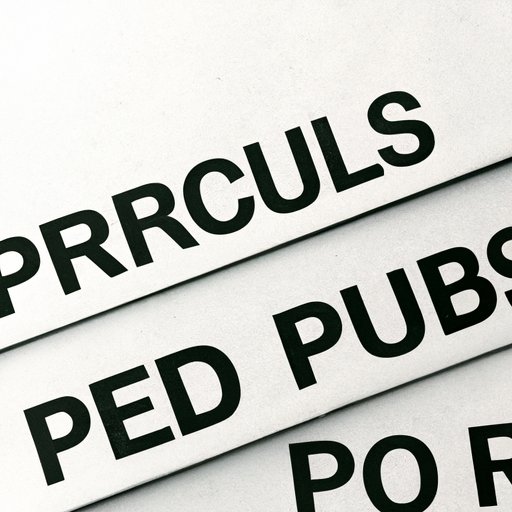
I. Introduction
Public records refer to any information that government agencies collect, maintain, and make accessible to the public. These records are essential to maintaining transparency, accountability and providing access to various kinds of information. Public records can cover a wide range of topics, from property deeds to court cases to government contracts. They can help you find lost relatives, research your genealogy, track down criminals, and much more. However, finding public records can be a complicated and expensive process without the right resources. In this article, we will explore various methods of finding public records for free.
II. 7 Top Websites to Find Public Records for Free in 2021
Several websites offer free access to public records, and here are the top seven:
- National Archives: This website is home to millions of records related to U.S. history, including court records, military records, and census data. You can easily search and download public records for free.
- ZabaSearch: This site allows you to search for public records by name, address, and phone number. ZabaSearch’s interface is user-friendly, and you can access basic details for free.
- CourtListener: This website provides access to court cases from all over the United States. You can search by keywords, type of court, and other categories, and download case documents for free.
- Bureau of Land Management: This online portal offers access to land patents, land title, and survey records. You can easily search and print public land records using this website
- USA.gov: This government website has a vast collection of public records, including patent and trademark data, federal budget records, and more. It is an excellent resource for anyone looking for public records covering government activities.
- FamilySearch: This website has a comprehensive library of genealogy records put together through an effort by the Church of Jesus Christ Latter-day Saints. The records cover billions of records like birth certificates, death certificates, census data, marriage and divorce records, and many more.
- OpenSecrets: This website is a treasure trove of information about political donations and lobbying activities in the U.S. It features data on federal elections and the money behind them. You can research politicians, political action committees, and lobbyists for free.
There are various methods of using these websites effectively. One tip includes using advanced search filters and keywords to narrow down your search and produce more accurate results.
III. The Ultimate Guide to Accessing Public Records for Free
With the advent of the internet, accessing public records for free has become more accessible than before. Here are the various types of public records and where to find them online:
1. Vital records:
Birth certificates, marriage licenses, and death certificates are essential records that can be found online. State government archives or national libraries of the country are suitable places to locate these documents. Family records can be obtained from familysearch.org, which collects vital records, including birth, marriage, and death certificates.
2. Property records:
Land records, deeds, and property information can easily be found online at the local or state level. Some sites to check include the county clerk and recorder’s office, the tax assessor’s office, and the local government property records department.
3. Criminal records:
Most states’ law enforcement agencies provide criminal and arrest records for free, but others may require a fee amount to access the records. Some websites to check include the national sex offender registry, state police website, or state office of the attorney general.
4. Court records:
Access to court documents is available online at local or state level courthouses. Court records can include civil and criminal case documents, probate and small claims records, and divorce settlement details. Court websites, PACER (Public Access to Court Electronic Records), and courtListener are some databases that contain court records.
Learning how to access public records requires attention to detail. To effectively access records online, there are a few important tips that you have to keep in mind:
- Identify the record you need;
- Understand what information is required to search for the record you need;
- Use critical keywords on the database website;
- If using initials or abbreviations, ensure that you know what they stand for.

IV. 5 Sneaky Ways to Unlock Public Records for Free
In addition to using public websites, these sneaky ways can help you access public records for free online:
1. Search Social Media:
Social media can hold a lot of valuable information, including individuals in your network and insights into their lives and experiences. A social media search can also provide vital clues about a person’s whereabouts and latest updates.
2. Use Google:
The Google website offers a range of advanced search options to uncover a vast range of public records. Features such as file type specifications, date range search, or domain search can help you to find the desired records you need.
3. Use Wiki
Wiki is an informational goldmine for searching out public records. As the platform remains an open-source business model, there is a wealth of knowledge amounts. A good example is looking up the public record of the United States in 2020, and it is likely the platform will deliver extensive sources.
4. Make Contact with the Public Agency:
By establishing a working relationship with law enforcement agencies, one can gain access to vital data stored on their systems. Information such as criminal records, property records, and vehicle registration data may be available, given the appropriate reason for use.
5. Use Networking Sites:
Networking sites for professionals can be another excellent avenue for finding public records. Examples of such platforms include LinkedIn. It can help users locate public records by leveraging its extensive database to access past and current workplace information.
V. Expert Tips: How to Find Public Records for Free in Your State
The accessibility of public records varies according to the rules and regulations set by each state. Here are critical tips to accessing public records in your state:
1. Know the Right Agency
Each state has a specific government agency that manages all records related to that state. By identifying the right agency, you reduce the amount of time and effort spent while trying to uncover information from other sources.
2. Know the Laws
Some states have strict laws in place regarding public record access. It is essential to understand appropriately what the state’s laws say about accessing public records before diving into the information. To do this, you can visit the state’s website or conduct comprehensive research on legal resources online.
3. Request the Records
Once you know the relevant agency and understand the laws surrounding public record access, you can make a formal request for the records you need. This is typically done by completing a public information request form, which can be found on the agency’s website.
VI. What You Need to Know to Locate Public Records Without Paying a Dime
Many people assume that public records access requires money. However, some vital pieces of information will provide a vital stepping stone when sought after and discovered free of charge. Here are three critical things you need to know to locate public records without spending any money:
1. Records are Available for Free
Much of the information people assume is only reachable through paid services is available for free. With just the right techniques, you can access several records without spending a dime.
2. Keep Your Search Specifics
When searching records, the more specific your search, the better the chances of finding the right results. Accessing records requires understanding how the database operates and using specific, relevant keywords to narrow down results.
3. Stay within the Law
Privacy laws have become increasingly stringent, and rightfully so. While gathering information concerning a person or entity may help solve a case, breaching their privacy can lead to massive personal and legal implications. It is essential to ensure all due process is followed when seeking any information.
VII. 10 Tricky Techniques to Find Public Records for Free Online
Advanced search operators offer a more refined approach in uncovering hidden details online. Here are ten tricky techniques:
- Use search terms such as “PDF” or “Excel” alongside the keyword you are searching for;
- Search multiple databases simultaneously using sites like realitytrac.com
- Use an asterisk (*) to search for terms that many represent different options;
- Use quotation marks to search for a string of words in an exact order;
- Use the minus sign (-) to remove pages that do not have the specific keyword;
- Use the site search function to search within a specific site or URL;
- Use advanced operators such as ‘inurl’ and ‘intitle’ to search for specific terms in a page’s URL or title;
- Use toolbars that allow for pop-up searching to enhance the speed and smoothness of the search process;
- Use search engines such as DuckDuckGo that do not store history;
- Save searches using tools such as Google Alerts and IFTTT to save a search for later review.
VIII. Conclusion
Accessing public records for free can be a complex and multi-faceted process. However, following our tips, tricks, and expert advice can significantly ease the process, and help you garner valuable information ultimately. Always remember to exercise caution when using any public information, and make sure you are using the information appropriately and legally.
We hope this article gave you unique tips to help you get the information you want without breaking the bank. Please use these resources responsibly and ethically as you seek the information you need.





